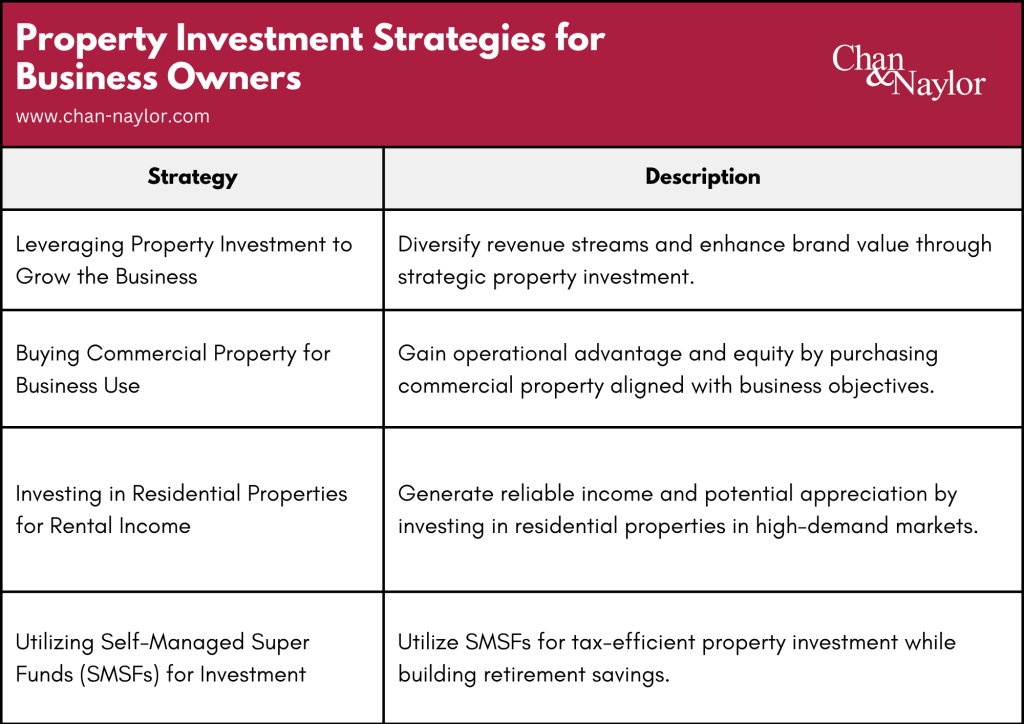Investment properties offer numerous advantages for business owners beyond just financial returns. They provide opportunities for wealth preservation, portfolio diversification, and tax advantages. Additionally, owning investment properties can serve as a hedge against economic uncertainties and provide a reliable source of passive income, complementing your primary business endeavors. Understanding how to leverage these assets effectively can significantly enhance your financial well-being and contribute to the resilience and success of your business.
Types of Investment Properties
As a business owner, understanding the different types of investment properties empowers you to make informed decisions about diversifying your portfolio and maximising returns. Here’s a breakdown:
Residential Properties
- Single-Family Homes: These are standalone houses typically occupied by one family. They offer stability and ease of management for first-time investors.
- Multi-Unit Apartment Buildings: These properties consist of multiple rental units within a single building. They offer scalability and higher potential for rental income but may require more management.
Commercial Properties
- Office Spaces: These properties are leased to businesses for office use. They often provide long-term leases and stable income streams but may require higher initial investments.
- Retail Outlets: These properties house retail businesses such as shops, restaurants, or shopping centers. They offer the potential for high foot traffic and lucrative rental income but may be subject to fluctuations in consumer spending.
Alternative Investments
- Vacation Rentals: These properties are rented out on a short-term basis to vacationers. They offer flexibility and potential for high rental yields, especially in tourist destinations, but may require more hands-on management.
- Real Estate Investment Trusts (REITs): REITs are companies that own, operate, or finance income-producing real estate across a range of property sectors. Investing in REITs provides diversification, liquidity, and access to professional management, making it a passive investment option for business owners.
Each type of investment property comes with its own set of benefits, risks, and considerations. By diversifying across different property types, you can mitigate risk and optimise your portfolio according to your business objectives, whether it’s generating stable rental income, achieving capital appreciation, or both.
Benefits of Investing in Property for Business Owners
1. Tangible Asset with Intrinsic Value
Property ownership provides you with a tangible asset that holds intrinsic value, unlike many other forms of investment such as stocks or bonds. This asset can offer a sense of security and stability, acting as a hedge against market volatility and economic uncertainties.
The physical nature of real estate means that even if market values fluctuate, you still possess a tangible asset with inherent worth, providing reassurance and stability for your overall financial portfolio.
2. Stable Source of Passive Income
Rental income generated from investment properties can serve as a reliable and stable source of passive income for your business. Whether it’s residential or commercial properties, the consistent stream of rental payments can supplement your business revenue, helping to diversify your income streams and provide financial stability.
This passive income can be especially beneficial during economic downturns or when your primary business experiences fluctuations in revenue, providing a cushion against financial challenges.
3. Tax Advantages
Property ownership offers various tax advantages that can significantly benefit business owners. Depreciation deductions allow you to deduct the cost of the property over its useful life, reducing your taxable income and lowering your overall tax liability.
Negative gearing benefits enable you to offset any losses from the investment property against other income, potentially reducing your tax bill. Additionally, capital gains tax concessions may apply when you sell the property, providing tax relief on any capital gains realised from the investment.
Understanding and leveraging these tax advantages can enhance your overall tax planning strategy and improve the after-tax returns on your investment property portfolio.
4. Leverage Your Expertise in Asset Management
As a business owner, you possess valuable skills and expertise in managing assets and identifying market opportunities. Investing in property allows you to leverage this expertise to enhance the performance of your investment portfolio.
By actively managing your investment properties, you can maximise rental income, minimise expenses, and capitalise on market trends to achieve optimal returns. Whether it’s property renovations, tenant management, or strategic acquisitions, your business acumen can be instrumental in unlocking the full potential of your property investments.
Property Investment Strategies for Business Owners
1. Leveraging Property Investment to Grow the Business
Recognise the potential of property investment as a tool for your business growth. By strategically allocating resources into real estate ventures, you can not only diversify your revenue streams but also bolster the overall financial health and resilience of your business. Property investment offers a unique opportunity to leverage your existing assets and expertise to generate additional income, enhance brand visibility, and create long-term value for your business.
2. Buying Commercial Property for Business Use
Purchasing commercial property for your business operations can offer numerous advantages, including greater control over your workspace, potential cost savings compared to leasing, and the opportunity to build equity in a tangible asset.
This strategy allows you to align your real estate investments with your business objectives, whether it’s expanding operations, consolidating facilities, or securing prime locations to enhance brand visibility and customer accessibility.
3. Investing in Residential Properties for Rental Income
Investing in residential properties for rental income provides a reliable source of passive income that can supplement your business revenue and contribute to long-term financial stability.
By carefully selecting properties in high-demand rental markets and implementing effective property management strategies, you can generate consistent cash flow while benefiting from potential capital appreciation over time.
4. Utilising Self-Managed Super Funds (SMSFs) for Property Investment
Self-Managed Super Funds (SMSFs) offer business owners a tax-efficient vehicle for investing in property while simultaneously building retirement savings.
By establishing an SMSF and directing contributions towards property investments, you can enjoy tax benefits such as concessional tax rates on rental income and capital gains, as well as potential asset protection and estate planning advantages.
Factors to Consider When Selecting a Property Investment Strategy
1. Financial Goals and Risk Tolerance
Before embarking on any property investment strategy, it’s essential to clearly define your financial goals and assess your risk tolerance. Whether your priority is maximising rental income, achieving capital growth, or balancing risk and return, aligning your investment strategy with your financial objectives is key to success.
2. Market Analysis and Property Research
Conducting thorough market analysis and property research is essential for finding profitable investment opportunities and reducing risks. Consider factors like location, demographics, supply and demand, and economic trends to make informed investment choices.
3. Legal and Regulatory Compliance
Ensuring compliance with legal and regulatory requirements is paramount when investing in property. From property acquisition and financing to leasing and property management, navigating the legal landscape requires diligence and attention to detail to avoid potential pitfalls and liabilities.
By considering these factors and implementing tailored property investment strategies, business owners can harness the power of real estate to drive business growth, enhance financial performance, and secure a brighter future for their ventures.
We’re here to help
Elevate your property investment strategies with Chan & Naylor. Our team of highly experienced business and property accountants is here to guide you on your journey to financial growth and generational wealth. With our expertise and tailored solutions, we can help you navigate complex tax regulations, optimise your investment portfolio, and unlock the full potential of your business and property investments. Don’t wait any longer to secure your financial future. Contact Chan & Naylor today to schedule a consultation and start building the path to success.
About Chan & Naylor
Since 1990, Chan & Naylor has partnered with thousands of business owners and property investors in managing their taxes and building a tax-effective wealth. Choosing Chan & Naylor means you’re not just selecting a service provider; you’re gaining a partner aligned with your financial goals. You’ll have access to a dedicated client manager supported by a team of accountants that specialises in business and property tax.
Disclaimer
This guide serves as general advice and may not account for the unique circumstances of individual readers. For personalised and strategic solutions tailored to your specific situation, we invite you to seek professional advice from Chan & Naylor. Our highly experienced team is dedicated to helping you navigate the complexities of Australian taxation, ensuring that your financial strategies align with the latest regulations. Contact us today to embark on a path of informed and customised tax planning for your property investments.






